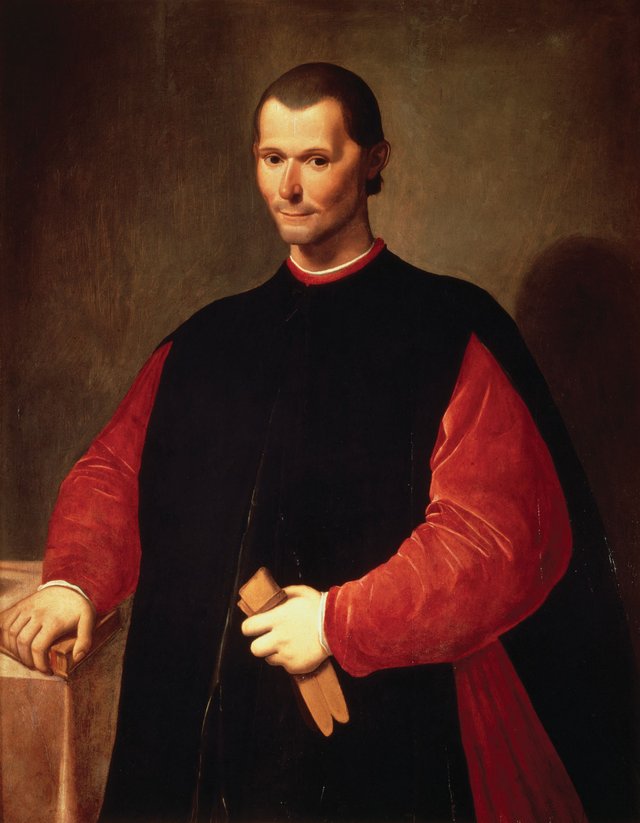The World of Niccolò Machiavelli
As most of you already know, our second steemSTEM Meetup is approaching, during which participants will have a chance to visit the Virgo lab located near Pisa in Italy, as well as to spend some quality time socializing with each other in the beautiful city of Florence. We decided to make a series of posts about prominent people who originated from this city, so that participants will be able to truly appreciate historical significance of Florence.

Life and work of Niccolò Machiavelli
Very few names are at the same time so deeply connected to politics and political science while being frowned upon, when their ideas are actually implemented. Niccolò Machiavelli (3 May 1469 – 21 June 1527) was one of these people. His most notable work is called The Prince - which is, simply spoken, a regent’s guide to power and how to maintain it. In the aftermath of that book, the term Machiavellianism was used to refer to people and/or politicians who dared to use strategies recommended by Machiavelli in order to achieve their goals.
But who was this guy anyway and why write now about him?
As most of you may know already, the @steemstem and @utopian-io meetup this year will take place in Florence, Italy. And, since you are all smart guys, you will likely have deducted that Niccolò Machiavelli was born there and later played a significant role in Florence’s society as well.
Although he had a successful career in politics for a few years – getting appointed at the office of second chancery, later he became the secretary of the Dieci di Libertà e Pace and finally he was put in charge of the Florentine militia – this success did not last.
After the Medici took control over the Florentine city-state, Machiavelli was dismissed from his office and later thrown into prison because it was thought he was conspiring against the Medici. Regardless of the torture he had to endure there, he did not confess to any conspiracy and eventually was released after three weeks.
Niccolò Machiavelli is considered as one of the first empirical (political) scientist, since he always drew conclusions based on experiences and facts as well as pointing out, how utterly pointless a mere theorizing without any empirical evidence would be. This can, of course, also be seen in his most famous work.
The Prince
Machiavelli put much emphasis on how important it is to carefully monitor the current situation of the state and then decide how to make the most out of it – meaning, how to take and maintain control. He usually described ideologies like religions as man-made and considered them only as a means to an end. If they were helpful to seize and maintain power, then a regent should use them accordingly, but not succumb to them.
Instead of relying on meta-physical concepts like gods and wonders (and justifying their own power with it), he encouraged the rulers to take risks and have ambitions to change the very being of the state and its society in total – if deemed necessary. Innovation was therefore not something a regent should frown upon but welcome with open arms, if it can be used to strengthen his grip around the state.
In contrast to most former political writers, Machiavelli had not much love for the classical good and evil dualism. In The Prince he describes extensively the various tasks a regent must fulfil, if he wishes to claim and maintain his power. Sometimes this can lead to somewhat extreme outcomes. According to Machiavelli, it is an acceptable mean to kill political opponents or act out other vicious deeds to establish a new government system. It should be noted though, that he puts a lot of emphasis on how to exactly do that. A wise ruler establishes beforehand how much cruelty he needs – and then acts according to it only once, because people tend to forget one immense cruelty faster than many continuous ones.
In Machiavelli’s world it is by far better to be feared than to be loved, since love can be an obstacle, if it is necessary to use violence against opponents, but if the regent is feared anyway, this is just a logical reaction. Although it is important to find the subtle balance between mere fear and hatred – a regent whose citizens despise him, will eventually have to deal with revolutionary actions and betrayal. Fear, on the other hand, can be used as a handy tool to establish control but not pushing the limits of one’s citizens beyond of what they are willing to endure.
In conclusion, it can be noted that Machiavellianism can be used as a way to seize and maintain power, using opportunistic and sometimes immoral means. This is also the reason why in modern psychology the term Machiavellianism is considered as one of the dark traits of personality inside the so-called dark triad. People who score high at this trait tend to be more ego-centrical and focused on personal success – even if that means they have to exploit others to achieve that.
Even today, the work of Niccolò Machiavelli has still quite some impact on various scientific disciplines and every day life. The city of Florence was the birthplace of some truly great minds – making it only logical to be the very gathering spot for great minds from all over the world.

Nice introduction of the knowledge.
He also has the most fun-to-pronounce name of any political scientist :)
This is a beautiful write up. It summarized the great life lived by a great man, Nicolo Machiavelli.
Kudos to the author, @steemstem.
that is a great man
Excellent summary, I think that every road to success must have some Machiavellianism, since one of its rules is to take advantage of others to emerge.
If one writes a book and it's relevant 100 years past their death...it's special. Cervantes, Machiavelli even Aristophones...who pretty much invented the sitcom. These are the giants.
Every time I hear the name; Niccolò Machiavelli, just two things come to my mind - "Machiavellianism", and also the "renaissance he brought to Italian politics"... Though the Machiavellian principle was misinterpreted by many, but in my opinion, this man was a great man of history.
Nice to read about him again
Excellent post about Niccolò Machiavelli @steemstem. Great character!. Thanks for sharing. Reagards.
Great work very interesting story about Nicole Machiavelli @steemstem
Excellent summary and post!
It is interesting how something so integral to the underlying social dynamics of politics was coined so accurately at this point in history. Machiavelli was brave to vocalize his findings publicly.
I am unfamiliar with the "dark triad" you mentioned that stems from modern psychology. What does this trait entail?